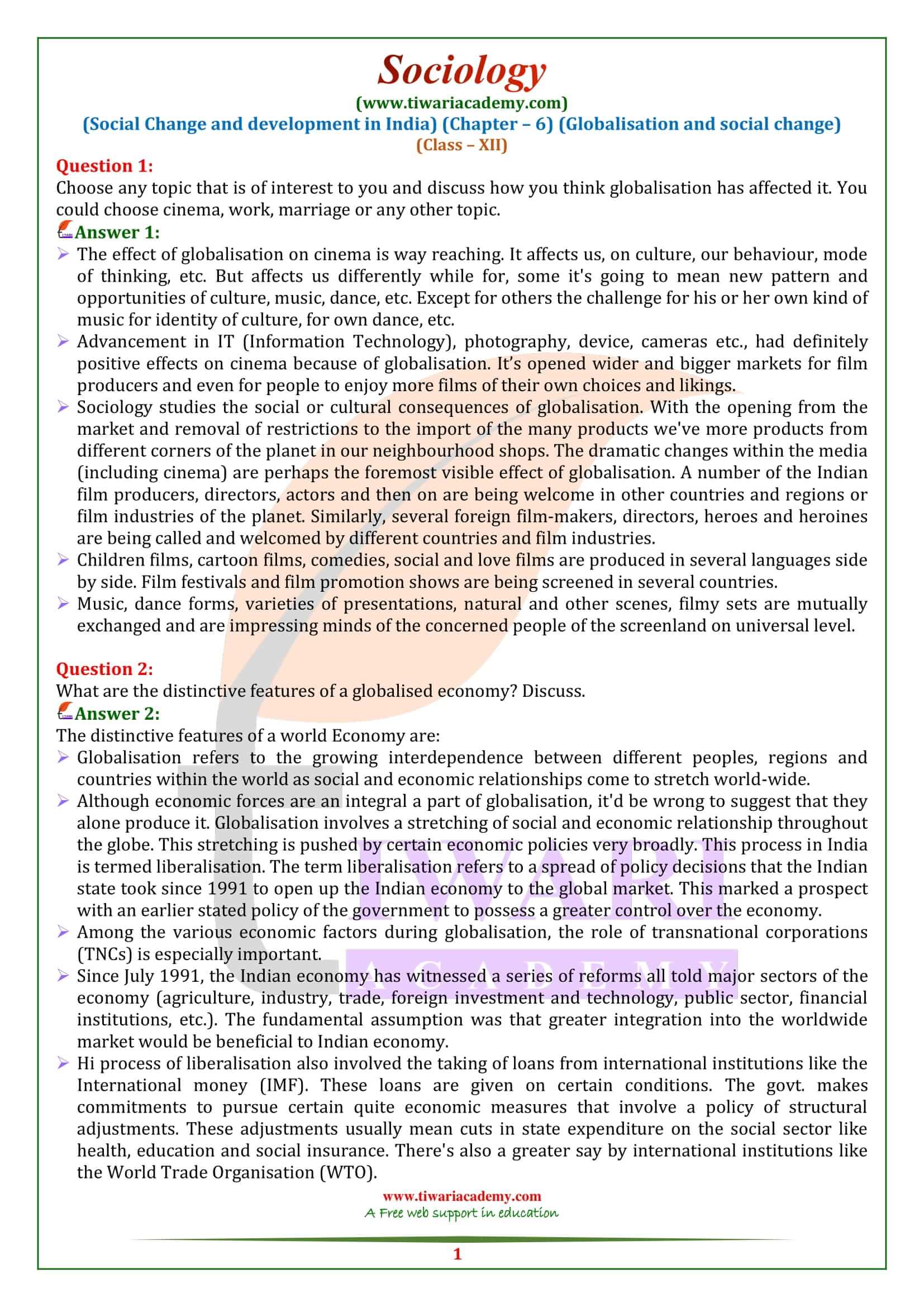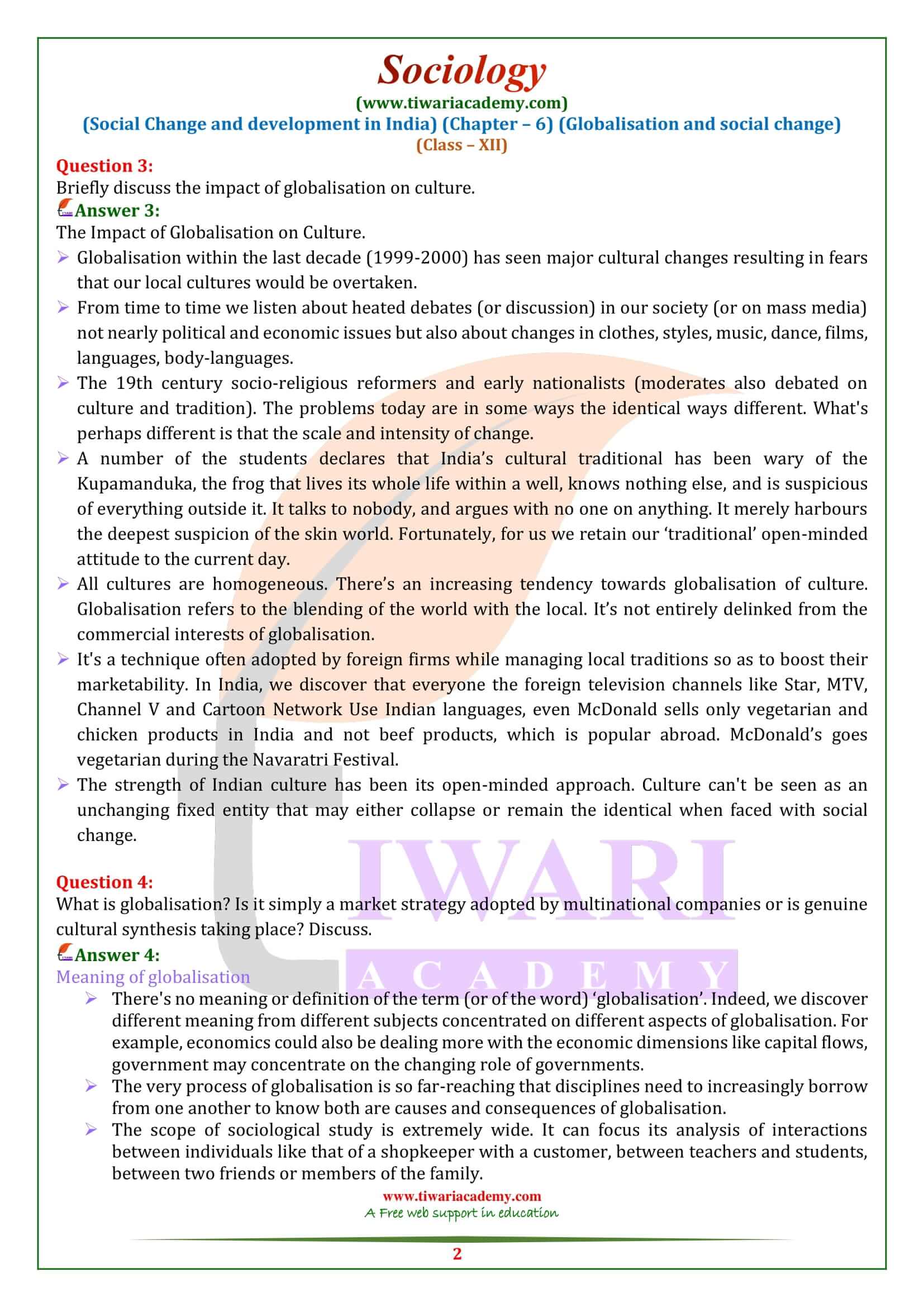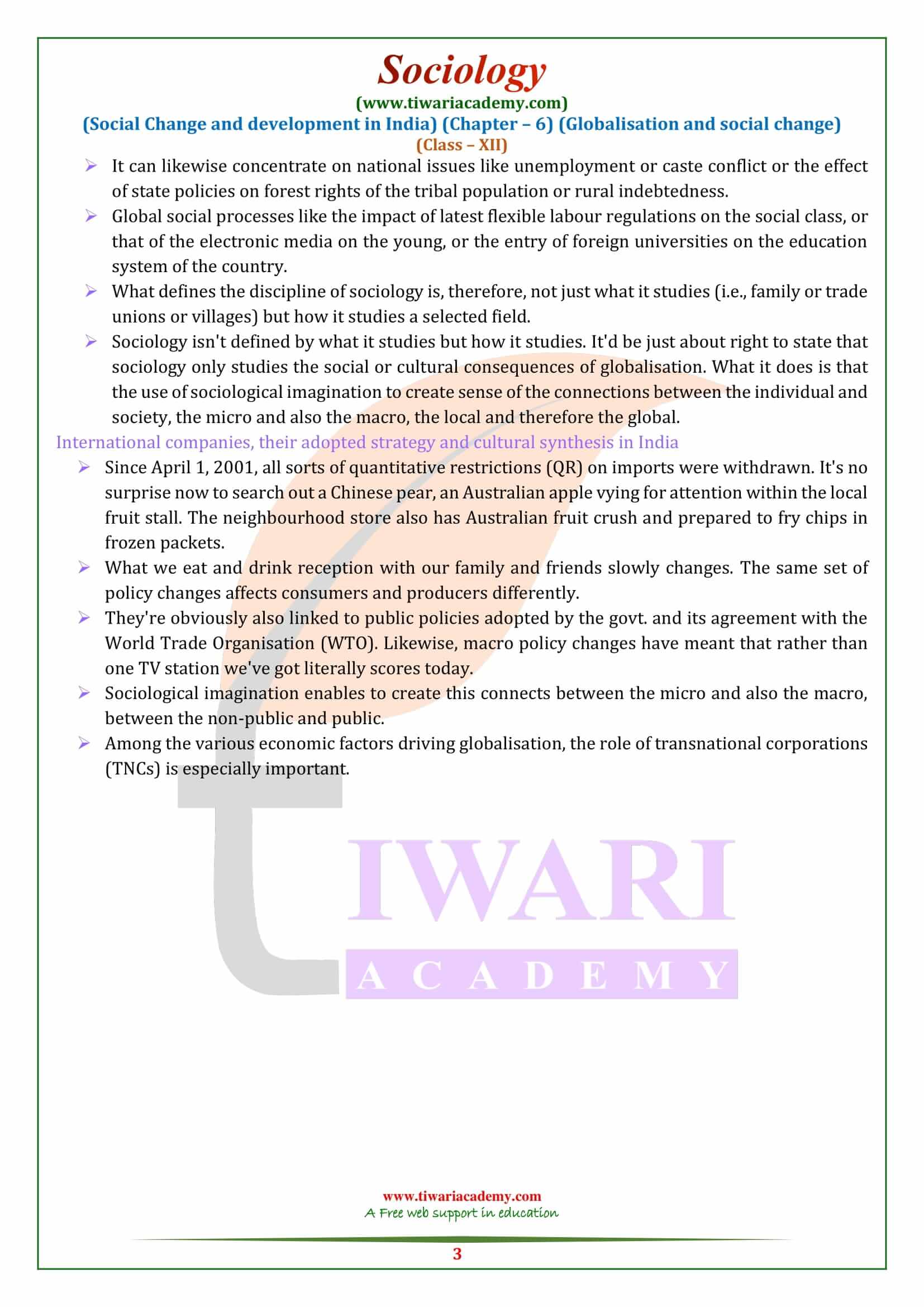NCERT Solutions for Class 12 Sociology Chapter 6 Globalisation and Social Change with exercises question answers and MCQ are given here for session 2025-26. Students of CBSE and State board Class 12 Sociology can take help in Part 2 Social Change and Development in India chapter 6 using the study material given here.
Class 12 Sociology Chapter 6 Globalisation and Social Change Quesiton Answers
Choose any topic that is of interest to you and discuss how you think globalisation has affected it. You could choose cinema, work, marriage or any other topic.
The effect of globalisation on cinema is way reaching. It affects us, on culture, our behaviour, mode of thinking, etc. But affects us differently while for, some it’s going to mean new pattern and opportunities of culture, music, dance, etc. Except for others the challenge for his or her own kind of music for identity of culture, for own dance, etc.
Advancement in IT (Information Technology), photography, device, cameras etc., had definitely positive effects on cinema because of globalisation. It’s opened wider and bigger markets for film producers and even for people to enjoy more films of their own choices and likings.
Sociology studies the social or cultural consequences of globalisation. With the opening from the market and removal of restrictions to the import of the many products we’ve more products from different corners of the planet in our neighbourhood shops. The dramatic changes within the media (including cinema) are perhaps the foremost visible effect of globalisation. A number of the Indian film producers, directors, actors and then on are being welcome in other countries and regions or film industries of the planet. Similarly, several foreign film-makers, directors, heroes and heroines are being called and welcomed by different countries and film industries.
Children films, cartoon films, comedies, social and love films are produced in several languages side by side. Film festivals and film promotion shows are being screened in several countries.
Music, dance forms, varieties of presentations, natural and other scenes, filmy sets are mutually exchanged and are impressing minds of the concerned people of the screenland on universal level.
What are the distinctive features of a globalised economy? Discuss.
The distinctive features of a world Economy are:
Globalisation refers to the growing interdependence between different peoples, regions and countries within the world as social and economic relationships come to stretch world-wide.
Although economic forces are an integral a part of globalisation, it’d be wrong to suggest that they alone produce it. Globalisation involves a stretching of social and economic relationship throughout the globe. This stretching is pushed by certain economic policies very broadly. This process in India is termed liberalisation. The term liberalisation refers to a spread of policy decisions that the Indian state took since 1991 to open up the Indian economy to the global market. This marked a prospect with an earlier stated policy of the government to possess a greater control over the economy.
Among the various economic factors during globalisation, the role of transnational corporations (TNCs) is especially important.
Since July 1991, the Indian economy has witnessed a series of reforms all told major sectors of the economy (agriculture, industry, trade, foreign investment and technology, public sector, financial institutions, etc.). The fundamental assumption was that greater integration into the worldwide market would be beneficial to Indian economy.
The process of liberalisation also involved the taking of loans from international institutions like the International money (IMF). These loans are given on certain conditions. The govt. makes commitments to pursue certain quite economic measures that involve a policy of structural adjustments. These adjustments usually mean cuts in state expenditure on the social sector like health, education and social insurance. There’s also a greater say by international institutions like the World Trade Organisation (WTO).
Briefly discuss the impact of globalisation on culture.
The Impact of Globalisation on Culture.
Globalisation within the last decade (1999-2000) has seen major cultural changes resulting in fears that our local cultures would be overtaken.
From time to time we listen about heated debates (or discussion) in our society (or on mass media) not nearly political and economic issues but also about changes in clothes, styles, music, dance, films, languages, body-languages.
The 19th century socio-religious reformers and early nationalists (moderates also debated on culture and tradition). The problems today are in some ways the identical ways different. What’s perhaps different is that the scale and intensity of change.
A number of the students declares that India’s cultural traditional has been wary of the Kupamanduka, the frog that lives its whole life within a well, knows nothing else, and is suspicious of everything outside it. It talks to nobody, and argues with no one on anything. It merely harbours the deepest suspicion of the skin world. Fortunately, for us we retain our ‘traditional’ open-minded attitude to the current day.
All cultures are homogeneous. There’s an increasing tendency towards globalisation of culture. Globalisation refers to the blending of the world with the local. It’s not entirely delinked from the commercial interests of globalisation.
It’s a technique often adopted by foreign firms while managing local traditions so as to boost their marketability. In India, we discover that everyone the foreign television channels like Star, MTV, Channel V and Cartoon Network Use Indian languages, even McDonald sells only vegetarian and chicken products in India and not beef products, which is popular abroad. McDonald’s goes vegetarian during the Navaratri Festival.
The strength of Indian culture has been its open-minded approach. Culture can’t be seen as an unchanging fixed entity that may either collapse or remain the identical when faced with social change.
What is globalisation? Is it simply a market strategy adopted by multinational companies or is genuine cultural synthesis taking place? Discuss.
Meaning of globalisation
There’s no meaning or definition of the term (or of the word) ‘globalisation’. Indeed, we discover different meaning from different subjects concentrated on different aspects of globalisation. For example, economics could also be dealing more with the economic dimensions like capital flows, government may concentrate on the changing role of governments.
The very process of globalisation is so far-reaching that disciplines need to increasingly borrow from one another to know both are causes and consequences of globalisation.
The scope of sociological study is extremely wide. It can focus its analysis of interactions between individuals like that of a shopkeeper with a customer, between teachers and students, between two friends or members of the family.
It can likewise concentrate on national issues like unemployment or caste conflict or the effect of state policies on forest rights of the tribal population or rural indebtedness.
Global social processes like the impact of latest flexible labour regulations on the social class, or that of the electronic media on the young, or the entry of foreign universities on the education system of the country.
What defines the discipline of sociology is, therefore, not just what it studies (i.e., family or trade unions or villages) but how it studies a selected field.
Sociology isn’t defined by what it studies but how it studies. It’d be just about right to state that sociology only studies the social or cultural consequences of globalisation. What it does is that the use of sociological imagination to create sense of the connections between the individual and society, the micro and also the macro, the local and therefore the global.
International companies, their adopted strategy and cultural synthesis in India
Since April 1, 2001, all sorts of quantitative restrictions (QR) on imports were withdrawn. It’s no surprise now to search out a Chinese pear, an Australian apple vying for attention within the local fruit stall. The neighbourhood store also has Australian fruit crush and prepared to fry chips in frozen packets.
What we eat and drink reception with our family and friends slowly changes. The same set of policy changes affects consumers and producers differently.
They’re obviously also linked to public policies adopted by the govt. and its agreement with the World Trade Organisation (WTO). Likewise, macro policy changes have meant that rather than one TV station we’ve got literally scores today.
Sociological imagination enables to create this connects between the micro and also the macro, between the non-public and public.
Among the various economic factors driving globalisation, the role of transnational corporations (TNCs) is especially important.




